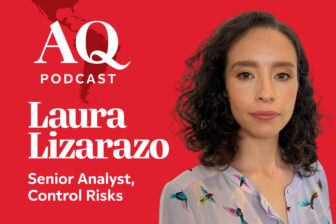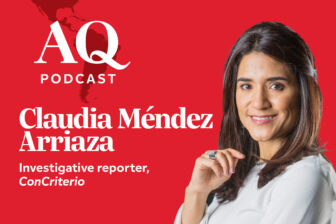BUENOS AIRES – Much has been said about the growing political discontent throughout Latin America, where a declining percentage of the population is satisfied with democracy – even in countries where social indicators have been improving, such as Chile, Colombia or Peru.
The symptoms of this malady are well known: A mistrust of the system; a disenchantment with traditional politics and politicians; a social fatigue prone to explode into civil unrest and massive demonstrations that conflate multiple social demands (on immigration, public transfers, identity politics, access to quality public goods and services) from increasingly vocal groups; and the rise of outsiders with a vague anti-system rhetoric catering to, and further fueling, ideological extremes and antagonistic polarization.
These symptoms are not new; we still need a good analysis of how they differ from, say, the protests of the late 1960s. And we need to be cautious not to generalize a phenomenon that differs across countries, with leaders that may share little more than a few selfies and communiqués.
But the most prominent Latin American faces of today’s “politics of emotion” – Jair Bolsonaro, Nayib Bukele, José Antonio Kast or Javier Milei on the right; Andrés Manuel López Obrador, Gabriel Boric or Gustavo Petro on the left – do have some things in common. They have blossomed as a direct response to traditional politics, exposing the fissures of liberal democracy and hollowing out the distribution of voters to the big fat tails of outsider populism.
And it seems possible that, after many years of avoiding the trend, this may be the year when Argentina goes down the same road.
What’s wrong with democracy?
In a previous article for AQ, I mentioned the paradox highlighted as far back as the 19th century by Alexis de Tocqueville that social frustration often grows as social conditions improve. We’ve seen this in Chile, where demands for better public services and privileges have been renewed and refined as a result of social progress over many years.
But that view, if anything, is certainly only a small part of the story. Perceived (and often actual) unfairness in the access to public goods and services (education, transportation, housing) or the social glass ceilings of a cast society are seen as hampering the promised social progress. The prevalence of socioeconomic origin and networking over human capital and effort, if not the corruption in the form of interest groups, revolving doors, and cronyism, reveals a society of privileges that betrays the balance between opportunity and merit that is at the root of the modern liberal credo.
Yet that cannot be all.
With a few exceptions, there is in the region a rising awareness of an economic underperformance relative to our fathers and to our neighbors (to our past and to other regions in the present): Talk of “lost decades” has been commonplace in Latin America, but today there seems to be no external driver for growth in sight, and therefore no brighter future ahead. This is it: Voters seem to be resigned, turning the vote into little more than a cathartic gesture.
There are also the long-standing shortcomings that economic development was supposed to fix, but could not (at least so far). Take, for example, social exclusion or, more generally, the dual insider-outsider nature of our societies that mimics the dual nature of labor markets, most visibly in the context of urban segregation. There is also the growing population dependent on public transfers in many countries, which does not help to attenuate the perception of unfairness. Season this with the diminished expectations from years of stagnant social progress, and the negativism that may initially seem a subjective Tocqueville disappointment starts to look more like a very objective pessimism.
To the previous list of “demand” factors we need to add an important “supply” consideration: the obsolescence of the political class. Professional politicians repeating tired speeches like Warren Beatty’s Bulworth, pushed to retirement by new generations with broader interests and a natural indifference toward patronizing old folks with little intergenerational appeal. The target of alt-right newcomers all around the world.
No single story can explain today’s angered flight to the extremes. At any rate, the drivers listed above should be enough to flag the complexity of the problem at hand and to discourage oversimplified diagnostics.
Moreover, this state of affairs has a clear impact on economic performance, as the pendular nature of polarized policies may deter investment while multiplying fiscal spending and tax burdens, causing the economy to underperform over time.
A negative feedback loop that in some quarters may be creating its own zeitgeists.
The barrani ethic
Argentina has until now been an exception to some of these trends. Indeed, over the past 40 years, Argentina’s economic mishaps have historically contrasted with its relatively solid democracy and heavily populated median-voter center.
But this year´s elections are now putting that conventional wisdom in doubt.
After the disillusionment with Mauricio Macri’s 2015-19 center-right government, an even deeper one with the current center-left administration of Alberto Fernández is paving the way for something potentially very different. We see rising support for the far left – which is pushing the Peronists away from the center and closer to Vice President Cristina Kirchner’s folkloric left. But most notably, we see rising support for an alt-right libertarian movement explicitly aligned with the conservative populism of Bolsonaro and Kast, with backing across diverse socioeconomic levels and cultural backgrounds.
A recent piece in an Argentine newspaper highlighted the case of Hector Espinosa, a low-income, informal, libertarian micro-entrepreneur who opened a bar in one of Buenos Aires’ most recognizable villas miseria (slums). Behind the bar hung a sign that said “100% barrani” – a term used in Argentina, usually with some pride, to denote the informal economy. (The term is derived from the Arabic word for “stranger.”) Indeed, Espinosa argued that, faced with a public sector that is both economically oppressive and inefficient, he had chosen to live outside, as an alien to the system. He and many others here, to a growing degree, celebrate the barrani life – and its underlying dog-eat-dog, every-man-for-himself ethical code.
It is hard not to sympathize with this view. Much as the hacker ethic of the 1970s reveled against its own vision of capitalism (the machine, the owners of technology and information), the barrani ethic, born out of Argentina’s excruciating tax system, is finding its own ideological rationale as a popular response to the failed welfare state.
Twenty years ago, rich Argentine libertarians, invoking political capture or inefficiency, would propose a “voluntary social policy” (charity) as a more effective way to distribute wealth than the taxes that fund public goods and services or direct transfers. Five years ago, young middle-class professionals, invoking labyrinthine taxes and non-sensical currency controls that ultimately benefited a few big importers, would argue that tax evasion should be considered a new human right, and hail bitcoin as the stepping stone of a crypto-libertarian ethic.
Today, Espinosa and many others like him defend “the hyper capitalist rules: merit, self-employment, unfettered competition,” embracing a barrani culture redolent of Hernando de Soto’s DIY micro entrepreneurs some decades ago. Epinosa offers the real estate market as an illustration: because of an ill-advised law, it is tough to rent an apartment in Buenos Aires, since tenants need not only up-front money but also a hard-to-get guarantee; in the self-regulated market of the slum, tenants only need cash.
Democracy’s wake-up call
In such an environment, it is only natural that the promises of more and better jobs from “traditional” politicians are received with disbelief: People understand that, for the foreseeable future, they will have to manage for themselves. So the less they have to deal with the state and its representatives, the better: This is the perfect breeding ground for the rise of a night-watchman minarchist like Javier Milei.
Whether he can capitalize in his “outsiderness” to score a surprise win is beyond the point: he is liberal democracy´s wake-up call. His very presence synthetizes many of the drivers of anti-politics, and the shortcomings that need to be addressed to revive the basic social contract of our democracies.
It is clear that policymaking and politics are not delivering what the society is expecting: the traditional “rational” swing between center left and center right looks unappealing and its agenda sounds dated.
Is the “political class” (however it is defined) tone-deaf, indifferent or unable to rebuild trust in Argentina and elsewhere? Can the current caste be revamped, or do we need new blood? And what exactly is behind the call for change – besides “a call for change”: an empty term that means different things to different people?
Whatever the answers to these questions are, there is no point in criticizing polarization or whining about the newcomers; they are just filling the void left by old-fashioned politics. Until it is replaced by a new narrative that is viable and inspiring enough to compete with the three-chord punk of outsider populists, a reform agenda that meets the new expectations and bring voters back to the center will find no buyers. The only way out of this trap is forward.









